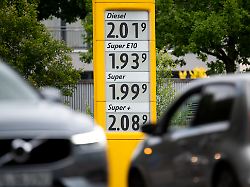What else can we afford?
Managing Director (28): Companies should have to disclose pricing
06/18/2023, 11:30 a.m
Energy and food in particular have become significantly more expensive. Inflation averaged 6.9 percent last year. Bei ntv.de betray regularly people from all salary brackets what that means for your everyday life – what they earn, what they spend how much money on and what is left over at the end of the month. Today:
Surname: Marcus Jaeger
Age: 28
Residence: Scheyern in the district of Pfaffenhofen near Ingolstadt
Education: Tiler
Recent Activity: Manager of a gas station that has been our family business for 70 years, now with a trailer and e-bike rental, parcel shop, 24-hour vending machines and a car wash.
Working hours per week: at least 50 to 60 hours
Monthly gross salary: 3700 euros base salary
Holiday and Christmas bonus: EUR 3,500 each plus an annual bonus payment of between EUR 10,000 and EUR 15,000 – dependent on profit and performance from our target agreements
Marital status: single, no children
Household net income per month: almost 2400 euros basic salary plus the equivalent of almost 800 euros from the annual payments
Monthly housing and energy costs: I live in an apartment in my parents’ commercial and residential building and I don’t have to pay rent or ancillary costs. We have a fireplace and oil heating.
Additional fixed costs per month:
- 120 euros for local public transport, I don’t have a car
- Telephone: 90 euros
- Internet: 50 euros
- Streaming: 40 euros
- Insurance: 200 euros for liability, legal protection and extended health insurance
- Pension provision: 100 euros
Bottom line, disposable monthly household income for groceries, hygiene, leisure time, clothing, holidays etc.: 1800 euros without the annual bonus payments, with it it is the equivalent of 2600 euros
How much more I spend on groceries today than I did a year ago: 60 to 70 percent. A year or two ago I spent about 100 euros a month in the supermarket, now 150 to 170 euros. That’s still relatively little because I travel a lot and therefore often eat out. I spend all the more money in restaurants.
What I spend the most money on: Vacation, namely 15,000 to 20,000 euros a year. The costs have risen significantly since the pandemic began, and flights in particular have become much more expensive. I still try to travel as often as possible, in some months I’m on the road every weekend.
Where am I already saving because of the high inflation: When it comes to groceries, I sometimes buy cheaper brands and throw away less. I would have further savings potential with my holiday expenses.
How much is left at the end of the month: 500 to 600 euros
How much of it I save: 50 percent of what’s left by the 28th of each month
The details of these most important incomes and expenses are based on self-disclosures and do not claim to be complete.
Exciting, isn’t it? If you would like to take part, please register via email participate[at]ntv.de
Wishes to politicians:
- Tax-free subsidies, such as inflation compensation, which employers can pay should be expanded so that more of the wage is left over.
- For more transparency, companies should be obliged to disclose their pricing. Our gas station is under a lot of pressure from customers, even though a liter of petrol costs up to 40 cents more at some other gas stations – in my opinion, that’s extortionate.
- For fair, affordable prices for every citizen, I would like to see a price cap for certain staple foods such as water, vegetables, eggs or milk.
